Business Law Assignment: Contract Law and Exclusion Clauses
VerifiedAdded on 2019/11/20
|7
|1560
|222
Homework Assignment
AI Summary
This business law assignment analyzes a case involving a chair purchase and the associated contract terms. The assignment delves into the distinction between puffery and terms of a contract, referencing the cases of REA Group Limited v Fairfax Media Limited and Carlill v Carbolic Smoke Ball Company. It examines whether a statement about a chair's quality is a term of the contract. The assignment further explores whether a representation about the chair's support constitutes a contract term, applying the objective intention test from Esso Petroleum v Mardon. It classifies contract terms as conditions, warranties, or intermediate terms, referencing Poussard v Spiers, Bettini v Gye, and Hong Kong Fir Shipping v Kawasaki Kisen Kaisha. Finally, the assignment assesses the validity of an exclusion clause in the contract, considering the principles from L'Estrange V Graucob, Curtis V Chemical Cleaning Co, and Baldry V Marshall, concluding that the exclusion clause does not restrict the buyer's rights.
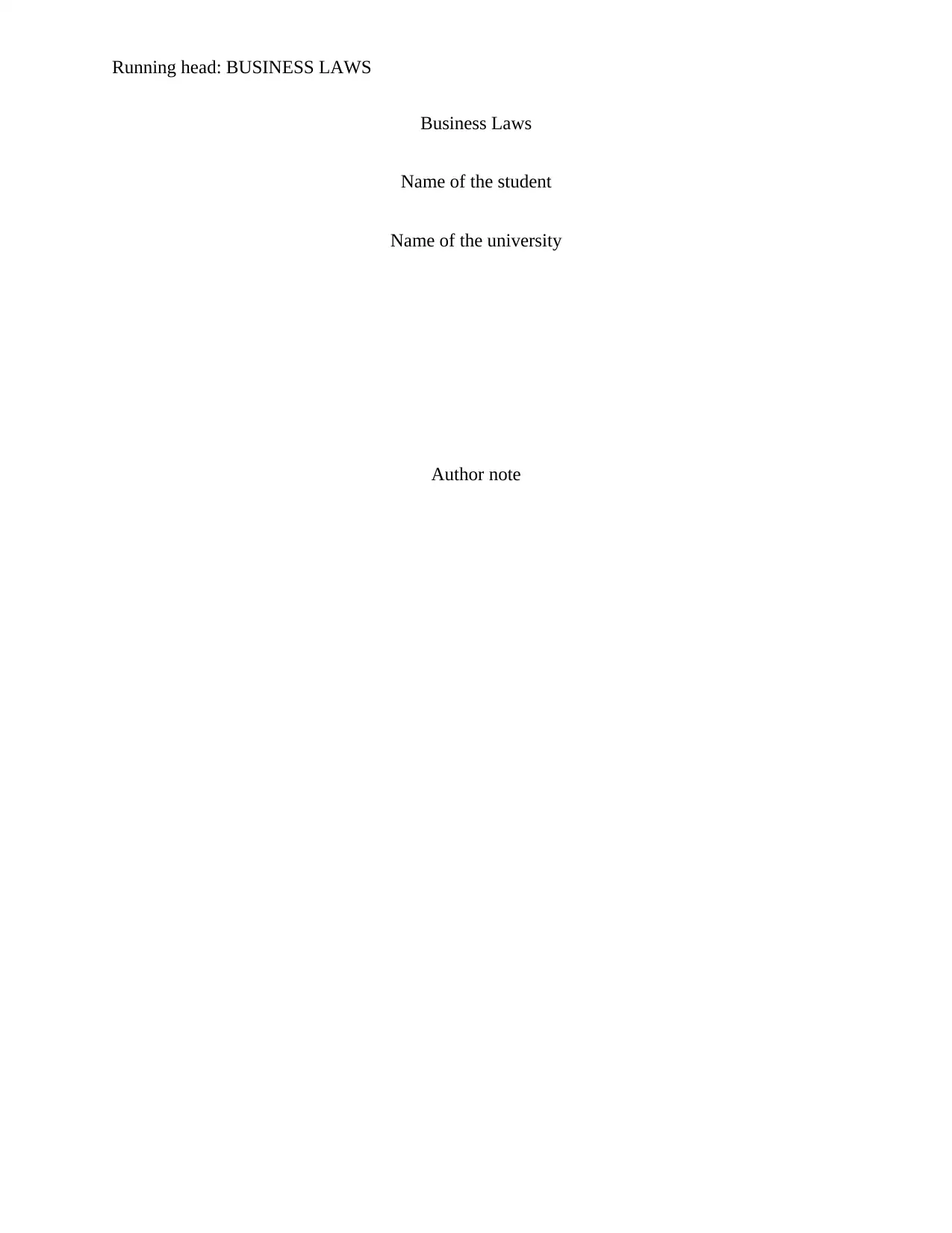
Running head: BUSINESS LAWS
Business Laws
Name of the student
Name of the university
Author note
Business Laws
Name of the student
Name of the university
Author note
Paraphrase This Document
Need a fresh take? Get an instant paraphrase of this document with our AI Paraphraser
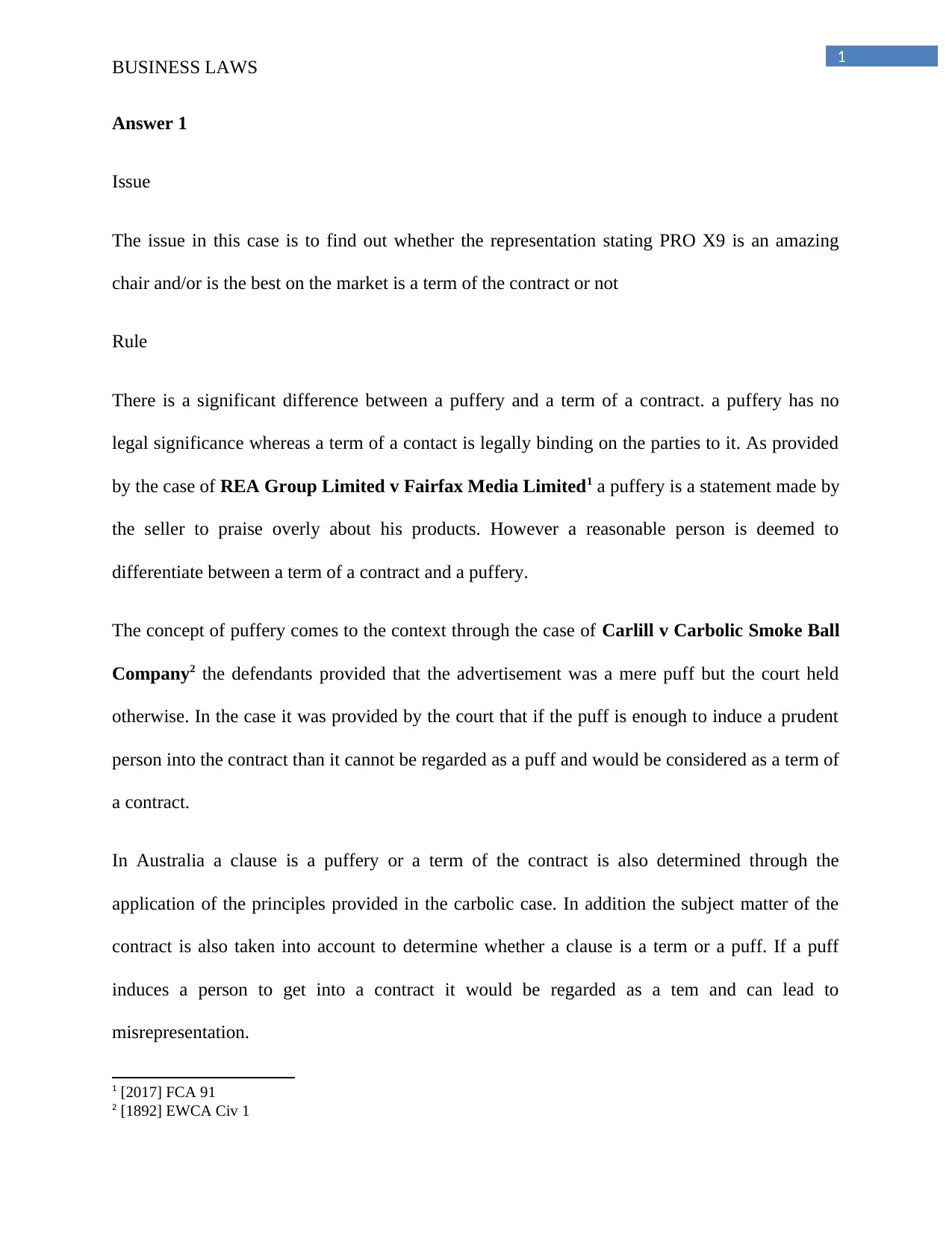
1
BUSINESS LAWS
Answer 1
Issue
The issue in this case is to find out whether the representation stating PRO X9 is an amazing
chair and/or is the best on the market is a term of the contract or not
Rule
There is a significant difference between a puffery and a term of a contract. a puffery has no
legal significance whereas a term of a contact is legally binding on the parties to it. As provided
by the case of REA Group Limited v Fairfax Media Limited1 a puffery is a statement made by
the seller to praise overly about his products. However a reasonable person is deemed to
differentiate between a term of a contract and a puffery.
The concept of puffery comes to the context through the case of Carlill v Carbolic Smoke Ball
Company2 the defendants provided that the advertisement was a mere puff but the court held
otherwise. In the case it was provided by the court that if the puff is enough to induce a prudent
person into the contract than it cannot be regarded as a puff and would be considered as a term of
a contract.
In Australia a clause is a puffery or a term of the contract is also determined through the
application of the principles provided in the carbolic case. In addition the subject matter of the
contract is also taken into account to determine whether a clause is a term or a puff. If a puff
induces a person to get into a contract it would be regarded as a tem and can lead to
misrepresentation.
1 [2017] FCA 91
2 [1892] EWCA Civ 1
BUSINESS LAWS
Answer 1
Issue
The issue in this case is to find out whether the representation stating PRO X9 is an amazing
chair and/or is the best on the market is a term of the contract or not
Rule
There is a significant difference between a puffery and a term of a contract. a puffery has no
legal significance whereas a term of a contact is legally binding on the parties to it. As provided
by the case of REA Group Limited v Fairfax Media Limited1 a puffery is a statement made by
the seller to praise overly about his products. However a reasonable person is deemed to
differentiate between a term of a contract and a puffery.
The concept of puffery comes to the context through the case of Carlill v Carbolic Smoke Ball
Company2 the defendants provided that the advertisement was a mere puff but the court held
otherwise. In the case it was provided by the court that if the puff is enough to induce a prudent
person into the contract than it cannot be regarded as a puff and would be considered as a term of
a contract.
In Australia a clause is a puffery or a term of the contract is also determined through the
application of the principles provided in the carbolic case. In addition the subject matter of the
contract is also taken into account to determine whether a clause is a term or a puff. If a puff
induces a person to get into a contract it would be regarded as a tem and can lead to
misrepresentation.
1 [2017] FCA 91
2 [1892] EWCA Civ 1
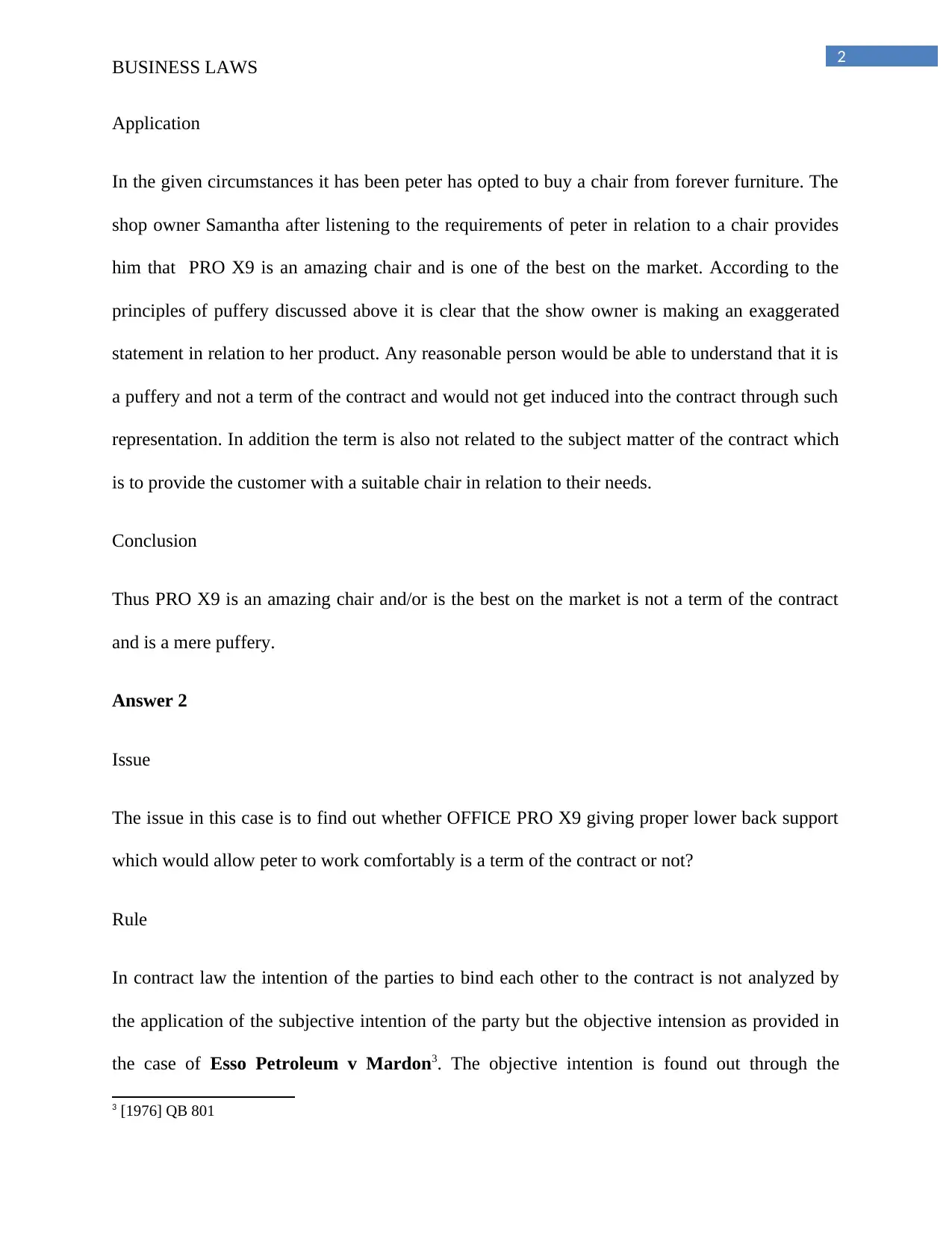
2
BUSINESS LAWS
Application
In the given circumstances it has been peter has opted to buy a chair from forever furniture. The
shop owner Samantha after listening to the requirements of peter in relation to a chair provides
him that PRO X9 is an amazing chair and is one of the best on the market. According to the
principles of puffery discussed above it is clear that the show owner is making an exaggerated
statement in relation to her product. Any reasonable person would be able to understand that it is
a puffery and not a term of the contract and would not get induced into the contract through such
representation. In addition the term is also not related to the subject matter of the contract which
is to provide the customer with a suitable chair in relation to their needs.
Conclusion
Thus PRO X9 is an amazing chair and/or is the best on the market is not a term of the contract
and is a mere puffery.
Answer 2
Issue
The issue in this case is to find out whether OFFICE PRO X9 giving proper lower back support
which would allow peter to work comfortably is a term of the contract or not?
Rule
In contract law the intention of the parties to bind each other to the contract is not analyzed by
the application of the subjective intention of the party but the objective intension as provided in
the case of Esso Petroleum v Mardon3. The objective intention is found out through the
3 [1976] QB 801
BUSINESS LAWS
Application
In the given circumstances it has been peter has opted to buy a chair from forever furniture. The
shop owner Samantha after listening to the requirements of peter in relation to a chair provides
him that PRO X9 is an amazing chair and is one of the best on the market. According to the
principles of puffery discussed above it is clear that the show owner is making an exaggerated
statement in relation to her product. Any reasonable person would be able to understand that it is
a puffery and not a term of the contract and would not get induced into the contract through such
representation. In addition the term is also not related to the subject matter of the contract which
is to provide the customer with a suitable chair in relation to their needs.
Conclusion
Thus PRO X9 is an amazing chair and/or is the best on the market is not a term of the contract
and is a mere puffery.
Answer 2
Issue
The issue in this case is to find out whether OFFICE PRO X9 giving proper lower back support
which would allow peter to work comfortably is a term of the contract or not?
Rule
In contract law the intention of the parties to bind each other to the contract is not analyzed by
the application of the subjective intention of the party but the objective intension as provided in
the case of Esso Petroleum v Mardon3. The objective intention is found out through the
3 [1976] QB 801
⊘ This is a preview!⊘
Do you want full access?
Subscribe today to unlock all pages.

Trusted by 1+ million students worldwide
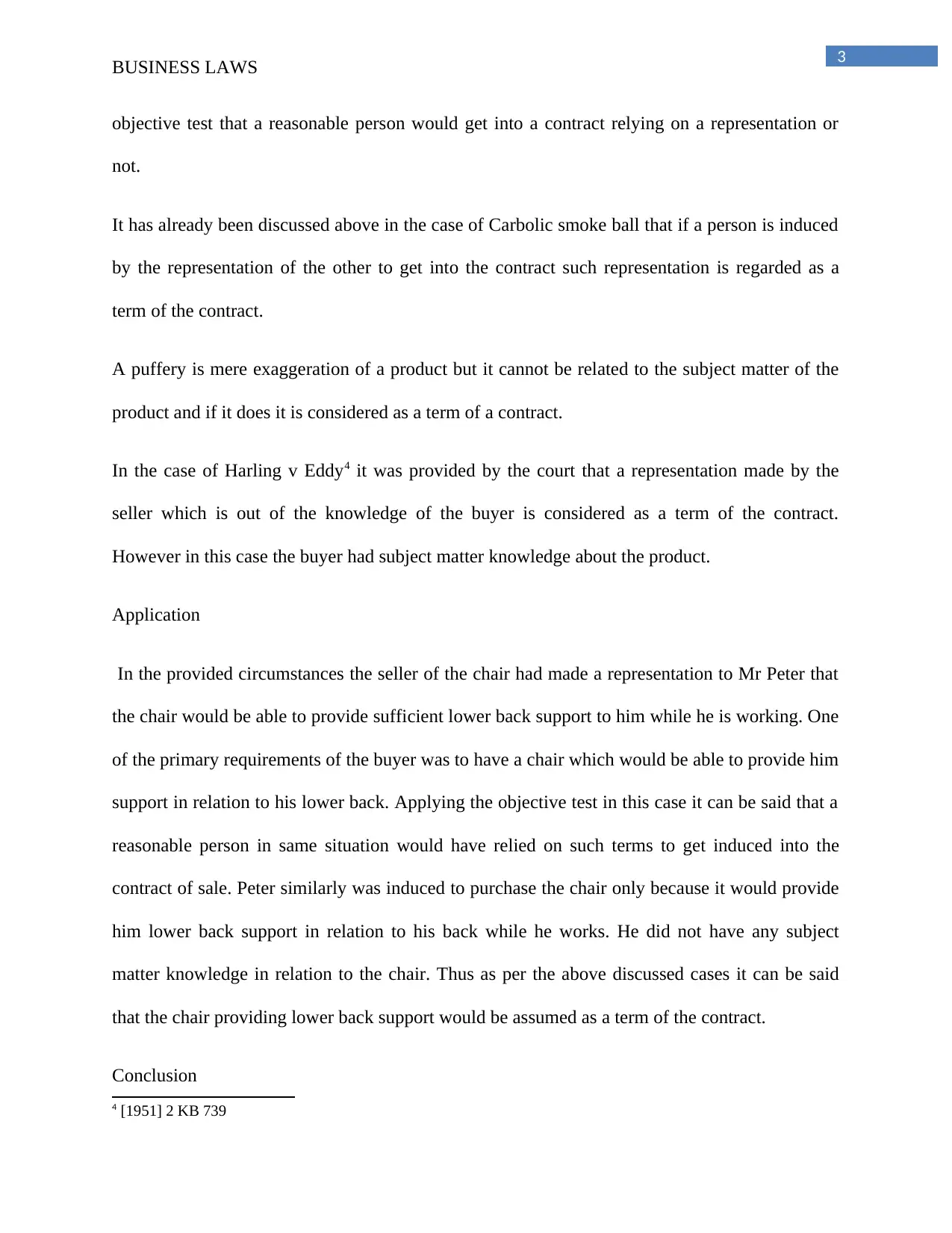
3
BUSINESS LAWS
objective test that a reasonable person would get into a contract relying on a representation or
not.
It has already been discussed above in the case of Carbolic smoke ball that if a person is induced
by the representation of the other to get into the contract such representation is regarded as a
term of the contract.
A puffery is mere exaggeration of a product but it cannot be related to the subject matter of the
product and if it does it is considered as a term of a contract.
In the case of Harling v Eddy4 it was provided by the court that a representation made by the
seller which is out of the knowledge of the buyer is considered as a term of the contract.
However in this case the buyer had subject matter knowledge about the product.
Application
In the provided circumstances the seller of the chair had made a representation to Mr Peter that
the chair would be able to provide sufficient lower back support to him while he is working. One
of the primary requirements of the buyer was to have a chair which would be able to provide him
support in relation to his lower back. Applying the objective test in this case it can be said that a
reasonable person in same situation would have relied on such terms to get induced into the
contract of sale. Peter similarly was induced to purchase the chair only because it would provide
him lower back support in relation to his back while he works. He did not have any subject
matter knowledge in relation to the chair. Thus as per the above discussed cases it can be said
that the chair providing lower back support would be assumed as a term of the contract.
Conclusion
4 [1951] 2 KB 739
BUSINESS LAWS
objective test that a reasonable person would get into a contract relying on a representation or
not.
It has already been discussed above in the case of Carbolic smoke ball that if a person is induced
by the representation of the other to get into the contract such representation is regarded as a
term of the contract.
A puffery is mere exaggeration of a product but it cannot be related to the subject matter of the
product and if it does it is considered as a term of a contract.
In the case of Harling v Eddy4 it was provided by the court that a representation made by the
seller which is out of the knowledge of the buyer is considered as a term of the contract.
However in this case the buyer had subject matter knowledge about the product.
Application
In the provided circumstances the seller of the chair had made a representation to Mr Peter that
the chair would be able to provide sufficient lower back support to him while he is working. One
of the primary requirements of the buyer was to have a chair which would be able to provide him
support in relation to his lower back. Applying the objective test in this case it can be said that a
reasonable person in same situation would have relied on such terms to get induced into the
contract of sale. Peter similarly was induced to purchase the chair only because it would provide
him lower back support in relation to his back while he works. He did not have any subject
matter knowledge in relation to the chair. Thus as per the above discussed cases it can be said
that the chair providing lower back support would be assumed as a term of the contract.
Conclusion
4 [1951] 2 KB 739
Paraphrase This Document
Need a fresh take? Get an instant paraphrase of this document with our AI Paraphraser
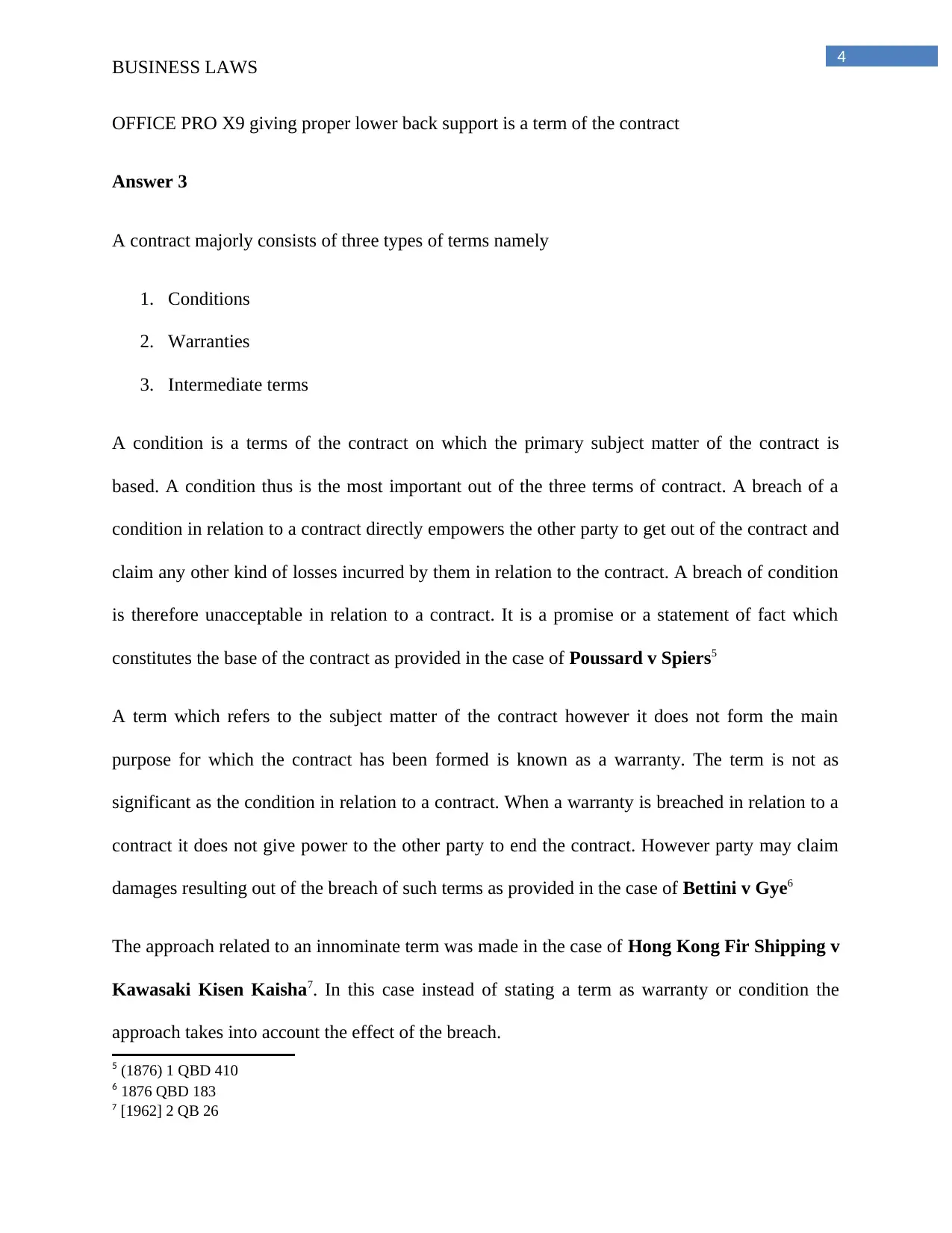
4
BUSINESS LAWS
OFFICE PRO X9 giving proper lower back support is a term of the contract
Answer 3
A contract majorly consists of three types of terms namely
1. Conditions
2. Warranties
3. Intermediate terms
A condition is a terms of the contract on which the primary subject matter of the contract is
based. A condition thus is the most important out of the three terms of contract. A breach of a
condition in relation to a contract directly empowers the other party to get out of the contract and
claim any other kind of losses incurred by them in relation to the contract. A breach of condition
is therefore unacceptable in relation to a contract. It is a promise or a statement of fact which
constitutes the base of the contract as provided in the case of Poussard v Spiers5
A term which refers to the subject matter of the contract however it does not form the main
purpose for which the contract has been formed is known as a warranty. The term is not as
significant as the condition in relation to a contract. When a warranty is breached in relation to a
contract it does not give power to the other party to end the contract. However party may claim
damages resulting out of the breach of such terms as provided in the case of Bettini v Gye6
The approach related to an innominate term was made in the case of Hong Kong Fir Shipping v
Kawasaki Kisen Kaisha7. In this case instead of stating a term as warranty or condition the
approach takes into account the effect of the breach.
5 (1876) 1 QBD 410
6 1876 QBD 183
7 [1962] 2 QB 26
BUSINESS LAWS
OFFICE PRO X9 giving proper lower back support is a term of the contract
Answer 3
A contract majorly consists of three types of terms namely
1. Conditions
2. Warranties
3. Intermediate terms
A condition is a terms of the contract on which the primary subject matter of the contract is
based. A condition thus is the most important out of the three terms of contract. A breach of a
condition in relation to a contract directly empowers the other party to get out of the contract and
claim any other kind of losses incurred by them in relation to the contract. A breach of condition
is therefore unacceptable in relation to a contract. It is a promise or a statement of fact which
constitutes the base of the contract as provided in the case of Poussard v Spiers5
A term which refers to the subject matter of the contract however it does not form the main
purpose for which the contract has been formed is known as a warranty. The term is not as
significant as the condition in relation to a contract. When a warranty is breached in relation to a
contract it does not give power to the other party to end the contract. However party may claim
damages resulting out of the breach of such terms as provided in the case of Bettini v Gye6
The approach related to an innominate term was made in the case of Hong Kong Fir Shipping v
Kawasaki Kisen Kaisha7. In this case instead of stating a term as warranty or condition the
approach takes into account the effect of the breach.
5 (1876) 1 QBD 410
6 1876 QBD 183
7 [1962] 2 QB 26
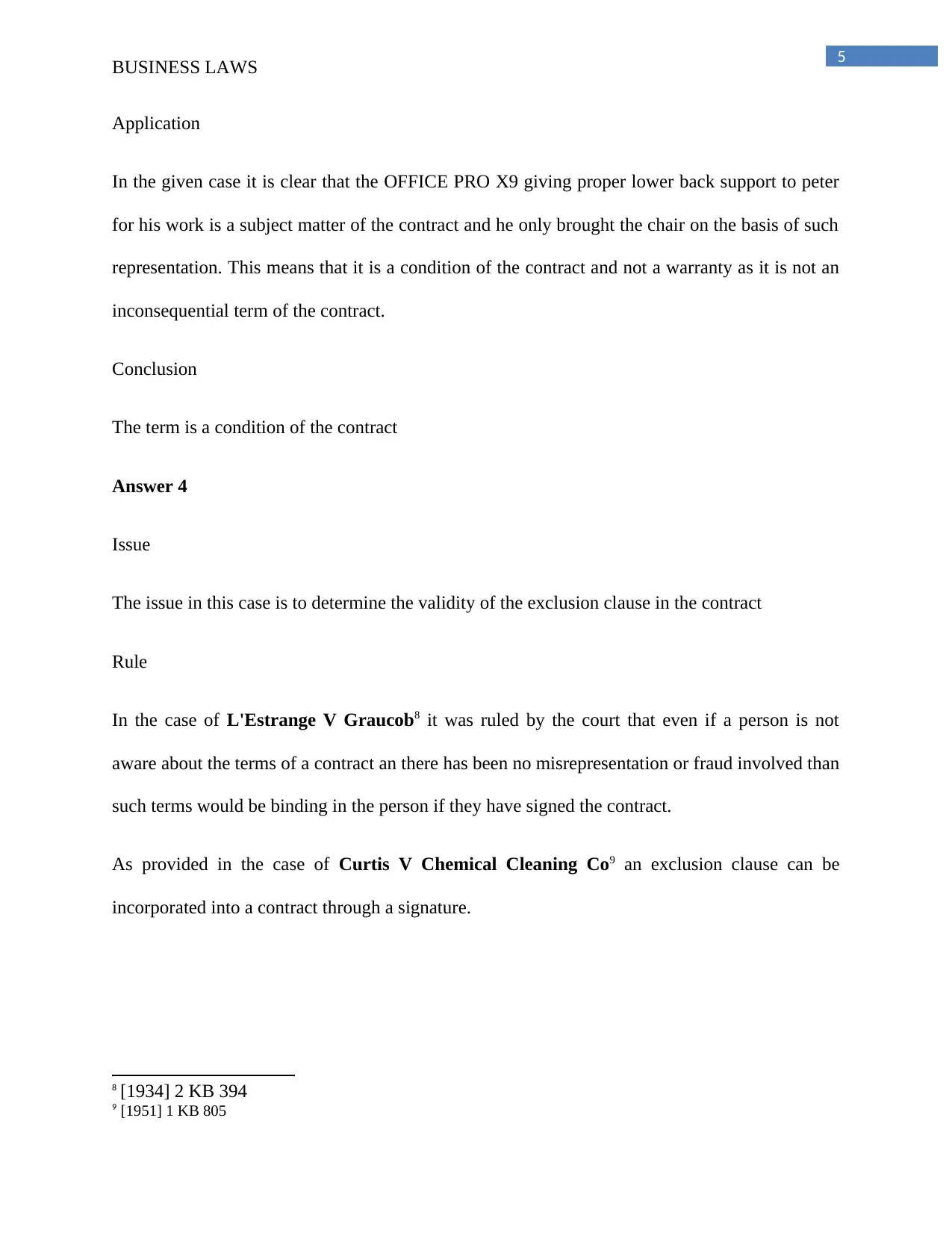
5
BUSINESS LAWS
Application
In the given case it is clear that the OFFICE PRO X9 giving proper lower back support to peter
for his work is a subject matter of the contract and he only brought the chair on the basis of such
representation. This means that it is a condition of the contract and not a warranty as it is not an
inconsequential term of the contract.
Conclusion
The term is a condition of the contract
Answer 4
Issue
The issue in this case is to determine the validity of the exclusion clause in the contract
Rule
In the case of L'Estrange V Graucob8 it was ruled by the court that even if a person is not
aware about the terms of a contract an there has been no misrepresentation or fraud involved than
such terms would be binding in the person if they have signed the contract.
As provided in the case of Curtis V Chemical Cleaning Co9 an exclusion clause can be
incorporated into a contract through a signature.
8 [1934] 2 KB 394
9 [1951] 1 KB 805
BUSINESS LAWS
Application
In the given case it is clear that the OFFICE PRO X9 giving proper lower back support to peter
for his work is a subject matter of the contract and he only brought the chair on the basis of such
representation. This means that it is a condition of the contract and not a warranty as it is not an
inconsequential term of the contract.
Conclusion
The term is a condition of the contract
Answer 4
Issue
The issue in this case is to determine the validity of the exclusion clause in the contract
Rule
In the case of L'Estrange V Graucob8 it was ruled by the court that even if a person is not
aware about the terms of a contract an there has been no misrepresentation or fraud involved than
such terms would be binding in the person if they have signed the contract.
As provided in the case of Curtis V Chemical Cleaning Co9 an exclusion clause can be
incorporated into a contract through a signature.
8 [1934] 2 KB 394
9 [1951] 1 KB 805
⊘ This is a preview!⊘
Do you want full access?
Subscribe today to unlock all pages.

Trusted by 1+ million students worldwide
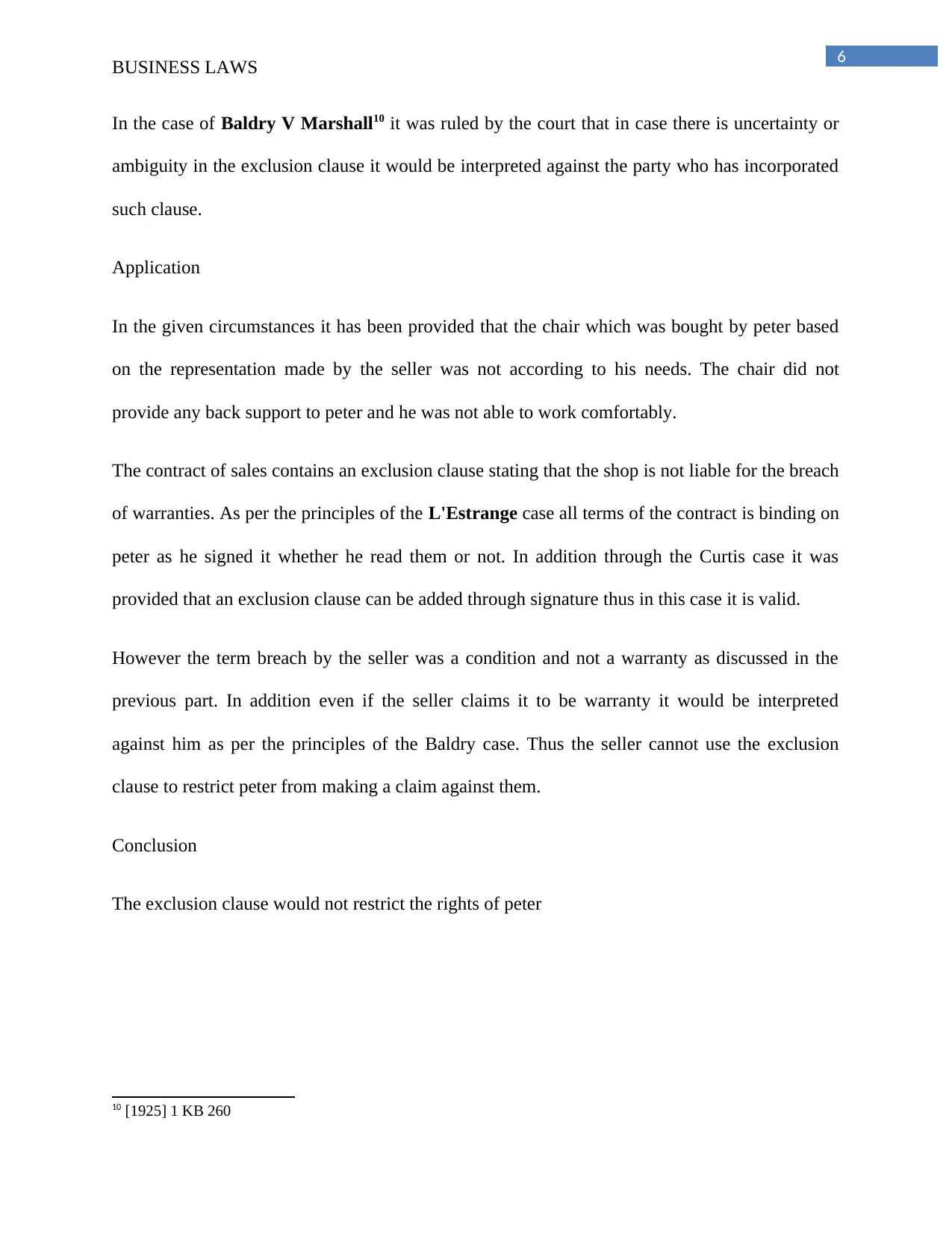
6
BUSINESS LAWS
In the case of Baldry V Marshall10 it was ruled by the court that in case there is uncertainty or
ambiguity in the exclusion clause it would be interpreted against the party who has incorporated
such clause.
Application
In the given circumstances it has been provided that the chair which was bought by peter based
on the representation made by the seller was not according to his needs. The chair did not
provide any back support to peter and he was not able to work comfortably.
The contract of sales contains an exclusion clause stating that the shop is not liable for the breach
of warranties. As per the principles of the L'Estrange case all terms of the contract is binding on
peter as he signed it whether he read them or not. In addition through the Curtis case it was
provided that an exclusion clause can be added through signature thus in this case it is valid.
However the term breach by the seller was a condition and not a warranty as discussed in the
previous part. In addition even if the seller claims it to be warranty it would be interpreted
against him as per the principles of the Baldry case. Thus the seller cannot use the exclusion
clause to restrict peter from making a claim against them.
Conclusion
The exclusion clause would not restrict the rights of peter
10 [1925] 1 KB 260
BUSINESS LAWS
In the case of Baldry V Marshall10 it was ruled by the court that in case there is uncertainty or
ambiguity in the exclusion clause it would be interpreted against the party who has incorporated
such clause.
Application
In the given circumstances it has been provided that the chair which was bought by peter based
on the representation made by the seller was not according to his needs. The chair did not
provide any back support to peter and he was not able to work comfortably.
The contract of sales contains an exclusion clause stating that the shop is not liable for the breach
of warranties. As per the principles of the L'Estrange case all terms of the contract is binding on
peter as he signed it whether he read them or not. In addition through the Curtis case it was
provided that an exclusion clause can be added through signature thus in this case it is valid.
However the term breach by the seller was a condition and not a warranty as discussed in the
previous part. In addition even if the seller claims it to be warranty it would be interpreted
against him as per the principles of the Baldry case. Thus the seller cannot use the exclusion
clause to restrict peter from making a claim against them.
Conclusion
The exclusion clause would not restrict the rights of peter
10 [1925] 1 KB 260
1 out of 7
Related Documents
Your All-in-One AI-Powered Toolkit for Academic Success.
+13062052269
info@desklib.com
Available 24*7 on WhatsApp / Email
![[object Object]](/_next/static/media/star-bottom.7253800d.svg)
Unlock your academic potential
Copyright © 2020–2026 A2Z Services. All Rights Reserved. Developed and managed by ZUCOL.





